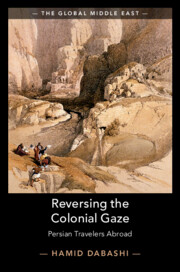Book contents
- Reversing the Colonial Gaze
- The Global Middle East
- Reversing the Colonial Gaze
- Copyright page
- Dedication
- Contents
- Figures
- Preface
- Acknowledgments
- Introduction
- 1 Mr. Shushtari Travels to India
- 2 Mirza Abu Taleb Travels from India
- 3 An Ilchi Wonders about the World
- 4 A Colonial Officer Is Turned Upside-Down
- 5 A Shirazi Shares His Travelogues
- 6 A Wandering Monarch
- 7 Hajj Sayyah Leads a Peripatetic Life
- 8 In the Company of a Refined Prince
- 9 A Wandering Mystic
- 10 In and out of a Homeland
- 11 The Fact and Fiction of a Homeland
- 12 Professor Sayyah Comes Home to Teach
- Conclusion
- Index
4 - A Colonial Officer Is Turned Upside-Down
Published online by Cambridge University Press: 19 December 2019
- Reversing the Colonial Gaze
- The Global Middle East
- Reversing the Colonial Gaze
- Copyright page
- Dedication
- Contents
- Figures
- Preface
- Acknowledgments
- Introduction
- 1 Mr. Shushtari Travels to India
- 2 Mirza Abu Taleb Travels from India
- 3 An Ilchi Wonders about the World
- 4 A Colonial Officer Is Turned Upside-Down
- 5 A Shirazi Shares His Travelogues
- 6 A Wandering Monarch
- 7 Hajj Sayyah Leads a Peripatetic Life
- 8 In the Company of a Refined Prince
- 9 A Wandering Mystic
- 10 In and out of a Homeland
- 11 The Fact and Fiction of a Homeland
- 12 Professor Sayyah Comes Home to Teach
- Conclusion
- Index
Summary
In Chapter 4, “A Colonial Officer Is Turned Upside-Down,” I turn to James Morier’s Adventures of Hajji Baba of Ispahan (1824). The inclusion of this landmark book by a British colonial officer lampooning Iran and Iranians requires some explanation. It is not the actual original book but its exquisite Persian translation by Mirza Habib Isfahani that later assumed a textual reality sui generis and became a key text in the course of the Constitutional Revolution of 1906–1911. The original is in fact a work of fiction and not a travelogue. But as a work of fiction, it falls into the category of picaresque literature, featuring a charlatan who navigates the borders of East and West pursuing his selfish interests. What is peculiar to this text is the reversal of its reception politics from its English original to its Persian translation. As much as its original went a long way in detailing the Orientalist fantasies of a British colonial officer, its Persian translation did precisely the opposite in mobilizing a nation against domestic tyranny and foreign domination alike. Mirza Habib Isfahani’s Persian translation also reveals the enduring significance of Istanbul, where he originally published his translation and where the leading Iranian public intellectuals, such as Mirza Aqa Khan Kermani and Sheikh Ahmad Ruhi, had gathered to facilitate massive social changes in their homeland. Mirza Habib was a close friend and confidant of such figures, and his translation and its wide reception therefore reveals the transnational public sphere from which the very idea of “Iran” as a nation eventually emerged.
Keywords
- Type
- Chapter
- Information
- Reversing the Colonial GazePersian Travelers Abroad, pp. 102 - 130Publisher: Cambridge University PressPrint publication year: 2020

